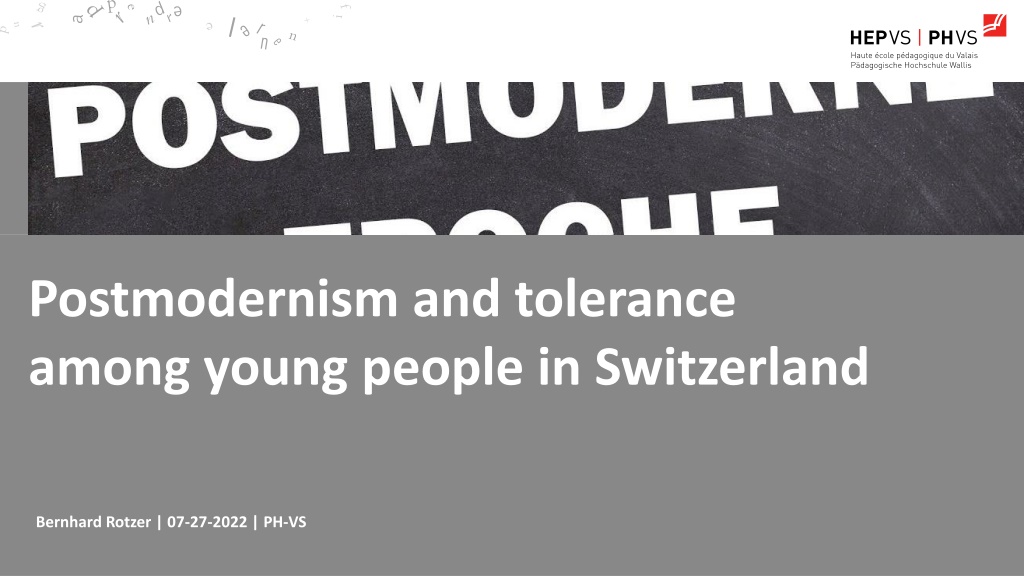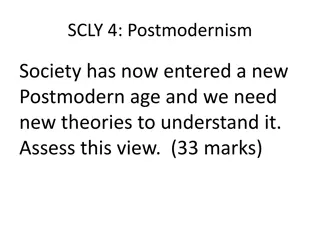
Tolerance and Postmodern Values Among Swiss Youth
Exploring postmodernism and tolerance among young people in Switzerland; from the evolution of Swiss society to the acceptance of diversity and individualism. The study delves into the values of Swiss youth in comparison to German counterparts, focusing on humanistic values and social plurality. Are young Swiss individuals leaning towards postmodern ideals, or are there remnants of modernity advocating for social homogeneity?
Download Presentation

Please find below an Image/Link to download the presentation.
The content on the website is provided AS IS for your information and personal use only. It may not be sold, licensed, or shared on other websites without obtaining consent from the author. Download presentation by click this link. If you encounter any issues during the download, it is possible that the publisher has removed the file from their server.
E N D
Presentation Transcript
Postmodernism and tolerance among young people in Switzerland Bernhard Rotzer | 07-27-2022 | PH-VS
Contents Swiss context Postmodernism SINUS Youth and Shel Youth Study Methodology Findings Conclusion 20.03.2025| 2
Modern Switzerland was founded in 1848, the Swiss Confederation was Protestant and Catholic in its worldview (cf. Maissen, 2010, p. 200 ff.). From a Christian Switzerland to a Switzerland of Diversity Heterogenization push due to ethnicity, language diversity and religious diversity. Digital world. This opens doors to the wider world and a further heterogenization of world views. While Switzerland was still dominated by a differentiated Christian society at the beginning of the 20th century, further social differentiation emerged from the second half of the same century onward, and the path from modernity to postmodernity can be traced well here. 20.03.2025| 3
Zygmunt Bauman established himself as a resolute Postmodernism opponent of uniform universalism and, in contrast, pleaded for an acceptance of many forms of life as the highest good. The main characteristic of postmodernism is the acceptance of diversity, in which not only pluralism is recognized as a social reality, but also great space is given to individualism (Zima, 2014, p. 69). 20.03.2025| 4
SINUS Youth Study 2020 The values of German young people between the ages Prior studies and research question of 14 and 17. Among the younger generation, binding social values such as family, altruism and tolerance are highly valued "The first priority is equal rights for people and poverty of course (male, 15 years [...] Shell Youth Study 2019 Confirms the importance of tolerance among young people 20.03.2025| 5
Are humanistic values in the sense of postmodernism as firmly anchored among Swiss Research questions young people as they are among those in Germany? And are young people interested in the postmodern values of social plurality, or are there constructs of modernity among young people in which social homogeneity is advocated and certain groups are excluded? 20.03.2025| 6
36 school assignments of 16- and 17-year-old Method adolescents between 2020 and 2021 bilingual school (German/French) in Switzerland Task of writing a text about a person of their choice from the world of ethics and religions in history or the present What influence the chosen person can have in the 21st century Grounded theory according to Anselm Strauss 20.03.2025| 7
Christian protagonists predominate the sample Important personalities Mother Teresa (4 texts) Dalai-Lama (3 texts) Pope Francis and Moses (2 texts each) Persons from politics are in second place, whereby the majority of them can be described as activists Martin Luther King and Rosa Parks were described the most Nelson Mandela (2 texts) 20.03.2025| 8
Mentioned categories 0 2 4 6 8 10 12 14 Racism Charity Feminism LGBTQIA+ 20.03.2025| 9
Categories The topics "racism" and "charity" predominate. 20.03.2025| 10
Racism The young people appreciate and admire the courage, tireless struggle and commitment to the disadvantaged: "I think it is courageous that Martin Luther King fought strongly against racial hostility. I admire him for wanting to show people that all people are equal" (T_19). It is important to the young people that they stand up for equality today and that inequalities, for example between People of Color (PoC) and whites, still exist. "She [Rosa Parks] would think that there is still a long way to go, but it is positive, and Rosa Parks would be proud of the fact that she literally changed the way things are seen, especially in relation to black people" (T_05). 20.03.2025| 11
Charity In this category, the name Mother Teresa stands out "I also recognize myself in her values, and I think the life and deeds she accomplished are wonderful" (T_17) or "Finally, I would like to say that in my opinion Mother Teresa was a very good person and is a role model to follow" (T_09). Pope Francis, Pierre Abb , Elizabeth of Hungary or Zacchaeus. The importance of solidarity and altruism is exemplified by a quote about Elizabeth of Hungary: "This touched me very much, because I would like to help the poor when I grow up. I would like to go to another country to help people who really need it. I think it is very important, and we need more people like Elisabeth" (T_03). Common to all texts is that equality between people is strived for and disadvantaged people should be helped Pierre Abb : "We must fight against injustice in our society!" (T_32). 20.03.2025| 12
Feminism Gis le Halimi Emmeline Pankhurst Rosa Parks "I chose this person because, first of all, she was a woman and women were not very respected in her time. Also, she was of color and eventually contributed to the struggle for gender equality" (T_20). "Gis le Halimi's final message to women: 'Organize, mobilize, be in solidarity,' by saying this, she makes us understand that we women need to support each other. We are not doing it enough" (T_16). 20.03.2025| 13
LGBTQIA+ Concerns of the LGBTQIA+ community were mentioned only twice Barack Obama's advocacy for equal rights for same-sex partnerships or for homosexual soldiers. Aristotle is described in the historical context of a more "open" Greek civilization regarding homosexuality and that he was against homophobia. 20.03.2025| 14
Postmodern Values The second largest category, "charity," follows these postmodern tendencies, because with plurality, ambivalences are also possible and desirable, and those who are "other" from a modern perspective are now no longer merely tolerated, but integrated into society in solidarity. [ ] the young people, a strong interest in altruistic action, be it with regard to racism, feminism or charity . 20.03.2025| 15
This study showed that Swiss young people accept social heterogeneity and, where it is not tolerated, even demand it. Further, the students were interested in the fight against poverty. In addition, feminism highlighted women's equality as an important issue, These representations reveal a postmodern mindset among young people that embraces universal diversity and does not stop at nations or cultures. "Postmodernism is incapable of exclusion. 20.03.2025| 16
Conclusion for teaching Intercultural learning Inclusion Cultural comparisons the starting point for intercultural education lies in the self-reflection of one's own norms and cultural characteristics 20.03.2025| 17
References Abels, H. (2017). Identit t(3. Auflage). Wiesbaden: Springer. Bauman, Z. (2015a). Lasst alle Hoffnung auf Totalit t fahren Ihr, die ihr eintretet in die Welt der fl chtigen Moderne. In Das Soziologiebuch (S. 136-143). bersetzt aus dem Englischen von K. Lehmann. M nchen: DorlingKindersley Verlag GmH. Bauman, Z. (2015b). Vom Nutzen der Soziologie (3. Auflage). bersetzt aus dem Englischen von C. Rochow. Frankfurt am Main: Edition suhrkamp. Bauman, Z. (2012). Moderne und Ambivalenz (2. Auflage). bersetzt aus dem Englischen von M. Suhr. Hamburg: Hamburger Edition. Bauman, Z. (2007). Fl chtige Zeiten. Leben in der Ungewissheit. Hamburg: Hamburger Edition. Bauman, Z. (1999). Unbehagen in der Postmodern. bersetzt aus dem Englischen von W. Schmaltz. Hamburg: Hamburger Edition. Biallowons, S. (2013). Franziskus. Der neue Papst. M nchen: K sel-Verlag. Bowker, J. (Ed.), (2003). Das Oxford-Lexikon der Weltreligionen. bersetzt aus dem Englischen von K.H. Golzio. Frankfurt am Main. Fischer Taschenbuch Verlag. Calmbach, M., Flaig, B., Edwards, J., M ller-Slawinski, H., Borchard, I. & Schleer, C. (2020). Wie ticken Jugendliche 2020? Lebenswelten von Jugendlichen im Alter von 14 bis 17 Jahren in Deutschland. In SINUS-Jugendstudie 2020. Bonn: Bundeszentrale f r politische Bildung. Abrufbar unter https://www.bpb.de/system/files/dokument_pdf/SINUS-Jugendstudie_ba.pdf (10. Februar 2022). Church, C.H, & Head, R.C. (2021). Paradox Schweiz. Eine Aussensicht auf ihre Geschichte. bersetzt aus dem Englischen von P. J hger. Z rich: ChronosVerlag. Crow, N. (2018). Her story. 50 starke Frauen & M dchen, die Geschichte schrieben. bersetzt aus dem Englischen von Y. Hergane. Frankfurt am Main: Fischer. Dalai Lama (2011). R ckkehr zur Menschlichkeit. Neue Werte in einer globalisierten Welt. bersetzt aus dem Englischen von W. G tting. K ln: L bbe. 20.03.2025| 18
de-academic(2022). Gis le Halimi. Abrufbar unter https://de-academic.com/dic.nsf/dewiki/524875 (31. M rz 2022). de Beauvoir, S. (1968). Das andere Geschlecht. Hamburg: Rowohlt. Flowers, C., Miller, S.M. & Robinson T.L. (1996). Die Menschen der Bibel. Ein illustriertes Lexikon der Heiligen Schrift. bersetzt aus dem Englischen von C. Arndt, A. Feilhauer & B. Lemper. Stuttgart. Verlag Das Beste. Fondation-abbe-pierre (2022). Abb Pierre'slife. Abrufbar unter https://www.fondation-abbe-pierre.fr/en/abbe-pierre-foundation/abbe- pierres-life (30. M rz 2022). Georgi, V.B. & Kek ll oglu, F. (2018). Integration Inklusion. In I. Gogolin, V. Georgi, M. Kr ger-Potratz, D. Lengyel & U. Sandfuchs (Hrsg.). Hanbuch Interkulturelle P dagogik. Bad Heilbrunn: Verlag Julius Klinkhardt. Hildenbrand, B. (2015). Anselm Strauss. In U. Flick, E. von Kardorff & I. Steinke (Hrsg.). Qualitative Forschung. Ein Handbuch (11. Auflage). S. 32-41. Hamburg: ro Verlag. Holland, J. (2007). Misogynie. Die Geschichte des Frauenhasses. Frankfurt a. M.: Zweitausendeins Verlag. Horn, C. (2003). Zum Begriff der Gerechtigkeit. Abrufbar unter https://www.kas.de/c/document_library/get_file?uuid=a5fd3183-b479-f548- 3d33-90a652454716&groupId=252038 (Januar 2022). Kraml, M., Sejdini, Z., Bauer, N. & Kolb, J. (2020). Konflikte du Konfliktpotentiale in interreligi sen Bildungsprozessen. Empirisch begleitete Grenzg nge zwischen Schule und Universit t. Stuttgart: Kohlhammer. Leimgruber, S. (2012). Interreligi ses Lernen (2. Auflage). M nchen: K sel Verlag. Maissen, T. (2010). Geschichte der Schweiz. hier+jetzt: Baden. Rutishauser, C.M. (2022). Freiheit in Krisenzeiten. In Zentraleurop ische Provinz der Jesuiten (Hrsg.). Stimmen der Zeit. (Heft 2). Freiburg im Br.: Herder. Seel, N.M. & Hanke, U. (2015). Erziehungswissenschaft. Lehrbuch f r Bachelor-, Master-und Lehramtsstudierende. Berlin, Heidelberg: Springer Verlag. Shell Jugendstudie [SJ] (2019). Zusammenfassung. Abrufbar unter https://www.shell.de/about-us/shell-youth- study/_jcr_content/par/toptasks.stream/1570708341213/4a002dff58a7a9540cb9e83ee0a37a0ed8a0fd55/shell-youth-study-summary- 2019-de.pdf (Januar 2022). 20.03.2025| 19
Spierling, V. (2017). Ungeheuer ist der Mensch. Eine Geschichte der Ethik von Sokrates bis Adorno. M nchen: C.H. Beck. Tanner, J. (2015). Geschichte der Schweizer im 20. Jahrhundert. C.H. Beck: Berlin. Th rner, C. & Hellmeier, H. (2018). Von Mozart bis Malala. Faszinierende Pers nlichkeiten, die jeder kennen sollte. Hamburg: Carlsen. Waldschmidt-Nelsson, B. (2018). Barack Obama 2009 2017. Der erste afroamerikanische Pr sident. A dream come true? In C. Mauch (Hrsg.). Die Pr sidenten der USA. 45 historische Portr ts von George Washington bis Donald Trump (S. 470-495). M nchen: C.H. Beck. Wilkerson, I. (2020). Caste. The lies that divide us. United Kingdom: Penguin Random House. Woodward, K. (2019). Power people. Frauen und M nner, die die Welt ver ndert haben. Was w rden sie raten? bersetzt aus dem Englischen von A. J ger. M nchen: arsEdition. Woodward, K. (2018). Power Women. Geniale Ideen mutiger Frauen. Was w rden sie dir raten? bersetzt aus dem Englischen von A. J ger. M nchen: arsEdition. Zima, P.V. 2014). Moderne / Postmoderne (3. Auflage). T bingen: UTB. 20.03.2025| 20
Thanks for your attention! 20.03.2025| 21


